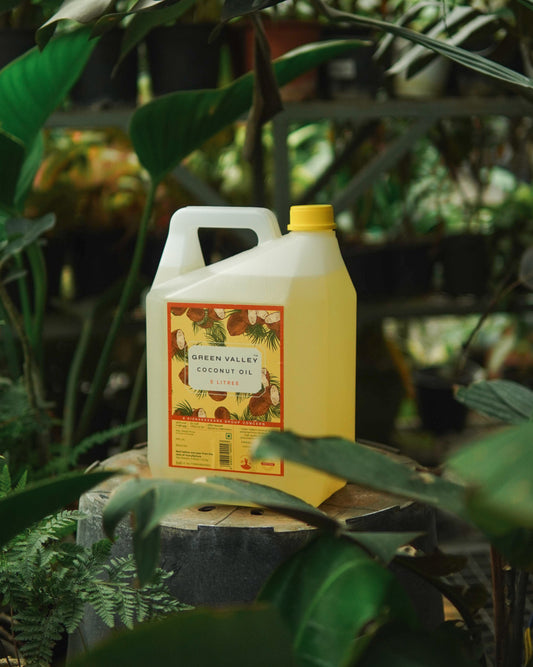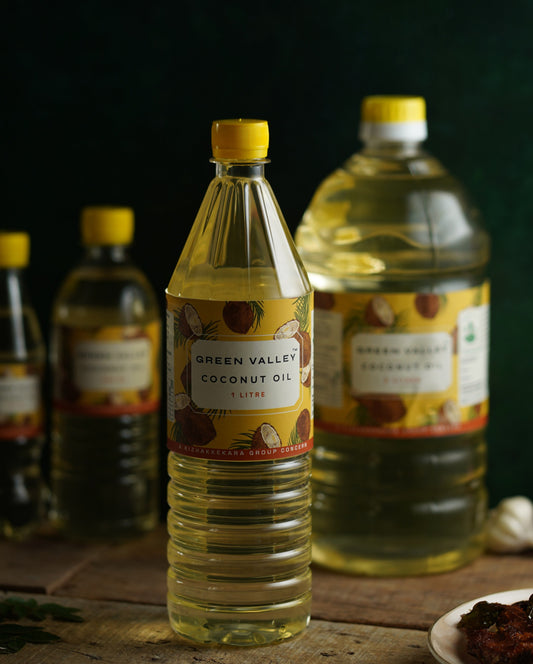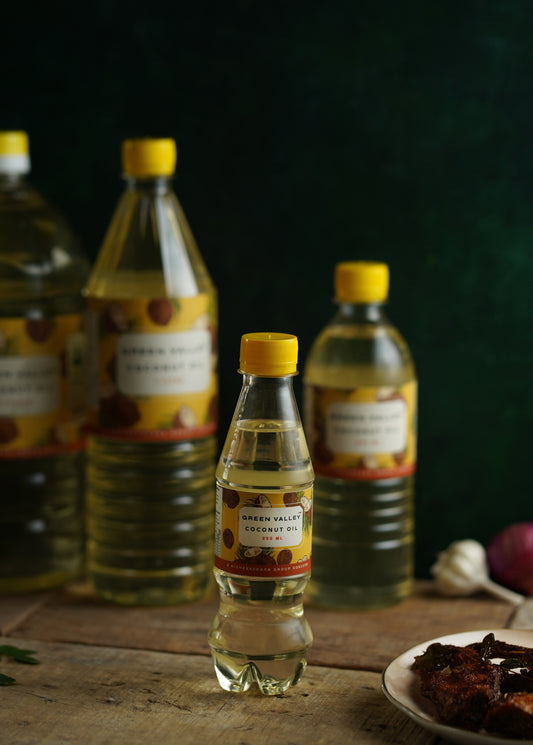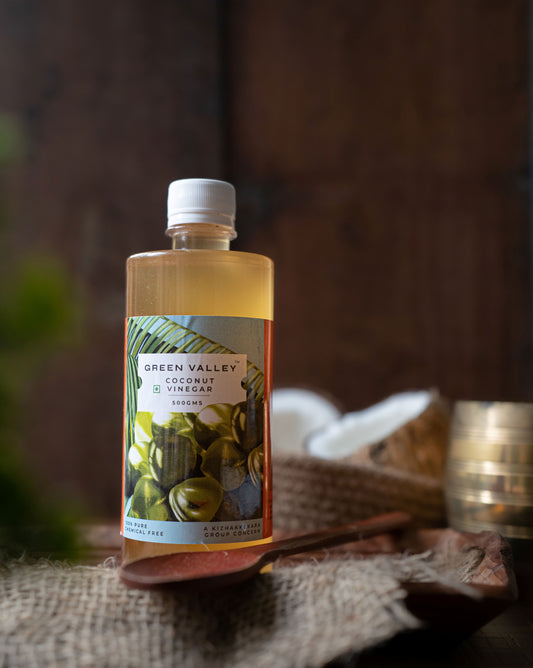Coconuts are one of the most important food crops in tropical countries like India. They are also used as a source of income by many people living in rural areas. Coconut trees can grow up to 30 metres tall and produce fruits that contain edible meat inside. Coconut oil is extracted from the fruit of the coconut palm tree. It is a rich source of medium chain fatty acids. It also helps reduce bad cholesterol levels and lowers blood pressure. It is often used as a cooking oil because it has a higher smoke point than olive oil. It is also used as a natural moisturiser and hair conditioner. Coconut oil is also known to help prevent heart disease, diabetes, cancer, arthritis, and Alzheimer’s disease.
It is the primary oil used in South India as well as countries like Sri Lanka, Philippines, Indonesia etc. Coconut oil being widely used in South India, the number of oil brands we have is plenty. Coconut oil production is one that used to be practised in most households for olden times. But over the years, as suburban and urban lifestyles have gained popularity and families are growing more nuclear, not all households have the availability of coconuts nor the time to take care of them and produce oil.
Coconut oil contains zero cholesterol, numerous health benefits and being a lifestyle essential is being sought after not only by South Indians. The usage culture has been spreading all over the country and demands are growing from other countries as well.
The Coconut OIl prices in India have been fluctuating over the years. Some as cheap as 120/L and some going up to 300/L. While it is true that the oil prices vary depending upon the processing, packaging and the company, it is possible to determine the basic cost of a good quality oil.
Green Valley has pledged to be transparent in its ways. So today let’s take a look at the cost breakdown of coconut oil in India.
Coconut Oil made from copra, which essentially is dried coconut meat. While there are a lot of options of sellers for coconuts, most are processed and adulterated with the addition of sulphur and smoking. While there are different types and quality of kernels available in India, Green Valley purchases all raw material directly from farmers of Palakkad to ensure high quality.
The wholesale price of a kilogram of coconut is Rs.23 as per date. 20% of a coconut kernel is made of coconut water. Out of the rest 80% of the mass left, the coconut undergoes air blowing twice. The resultant copra is only 35% of the 800 grams. To give you an idea, 100 kilograms of coconut kernel produces only 28 kilograms of copra. The copra is further processed where coconut oil is extracted from it. The amount of coconut oil extracted is equivalent to 60% of the copra. In short, a kilogram of coconut produces 182 grams of coconut oil. Calculating the prices, the raw material cost alone for a good quality coconut oil would come up to Rs.128 per kilogram. Including production charges, utility bills and labour charges, the price per kilogram would come up to Rs. 169. Deducting the prices of the by-products (which are sold to a third party), the final production cost would come around an estimate of Rs. 155. A litre of coconut oil is 910 grams. Hence the price of a litre would be Rs. 142. Adding on a 5% tax and packaging cost, the final cost is around Rs.150-155. Now the finished product goes through a lot of hands before it gets to the consumer. The wholesaler/distributor and the retailer act as middlemen to the sale. Each of them would expect a decent margin. Not to mention the margin that we, as the producers would desire. Rounding it all off, it is close to impossible to produce good quality products at a price less than 170-180. However the prices may vary according the season and the price of the raw materials.
Summing up the breakdown :
Raw material (coconut kernel) : Rs. 128
Production and labour : Rs.40
Tax : Rs.7
Margin : Rs. 20-30
Deduction : 14 (coconut by-products)
Total : 180
Although there are different processes that can be used to produce coconut oil, some are superior to others. It is important to follow each step of the process to the dot and not take shortcuts. But due to the recent low pricing trend, manufacturers have been opting to cut costs in the processing and purchasing sulphur treated and smoked coconuts. Coconut contains moisture and can easily go bad if not used the day for production. It is important to use fresh coconuts for production to reduce chances of rancidity. Sulphur is added as a preservative which acts as antimicrobial agent for preventing bacteria, fungus etc. Sulphur is a toxic food preservative which restricts lung performance and leads to direct allergenic reactions. Sulphur and smoke treatment reduces chances of rancidity while allowing the copra to last longer without going bad. Although this practice is allowed by the state in limited amounts, sulphur when entering the body can cause numerous respiratory problems and increases chances for cancer, not to mention the environmental impacts.
As you can see, there isn’t much profit left. It has been proving difficult to compete with other competitors that produce cheap oil while keeping up the quality. Although it leaves much to contemplation, how does one produce cheap coconut oil and still reap benefits from it? Being a staple that is widely used, it is important for coconut oil prices to be low. But it is not always an indicator of the quality of the oil. Healthy oil is always viably priced. Now that you know the price breakdown for yourselves, think about it and choose wisely.
Information as per 2022 October









1 comment
I hadn’t thought about it this way before. Your blog made me reconsider my perspective.
Thankyou for sharing this blog to us.
https://shuru.co.in/mandi/coconut-ka-bhav